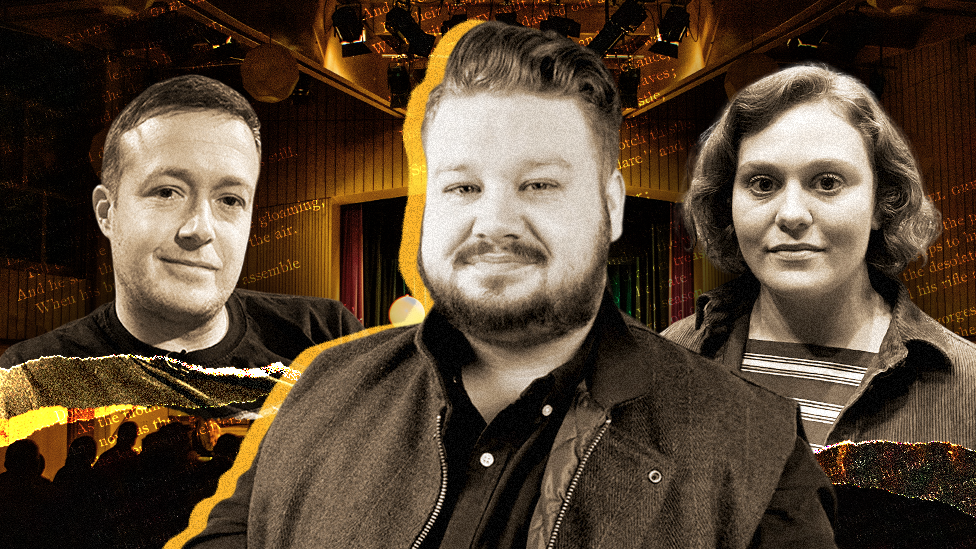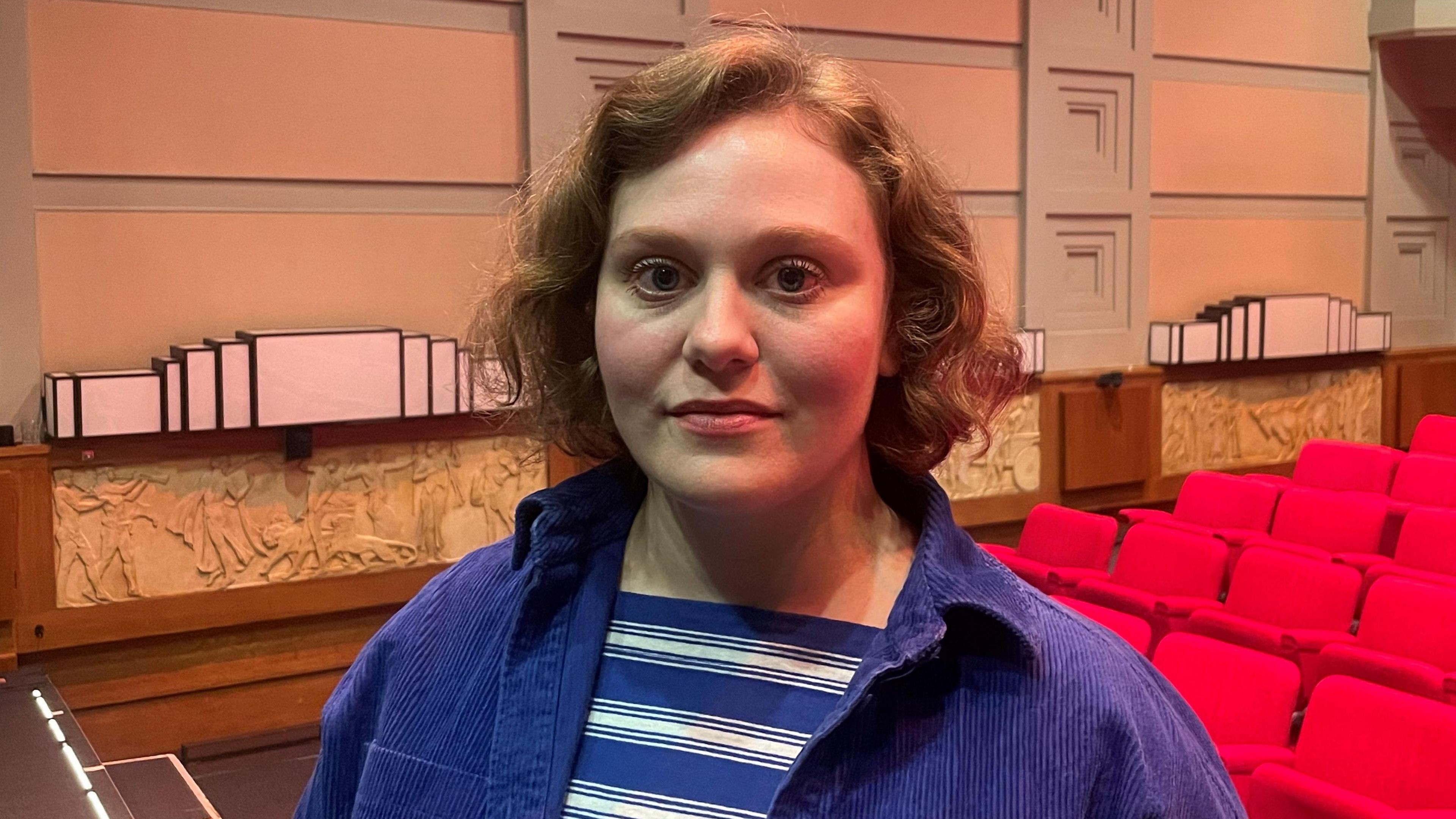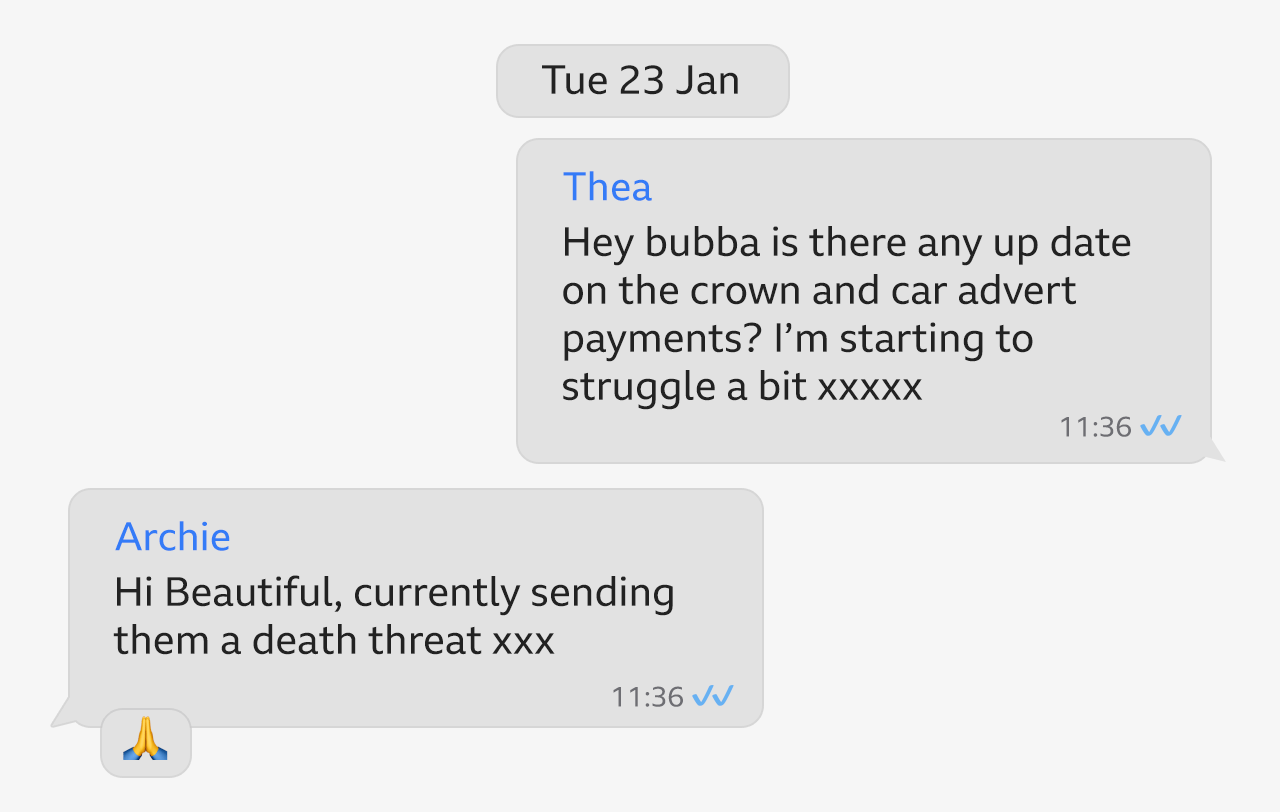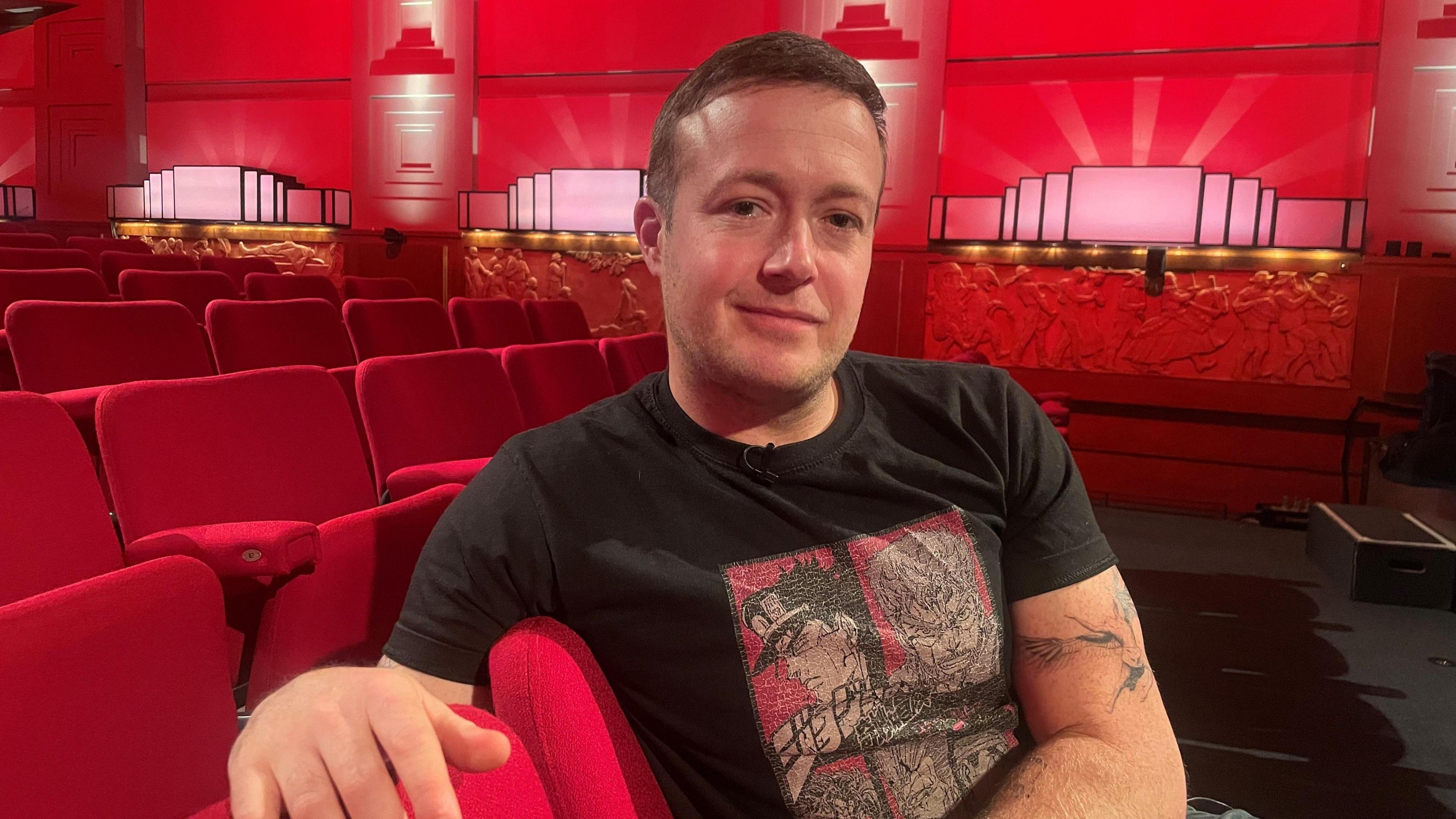'Lying talent agent left us in lurch without cash and hope'

- Published
Opportunities were pouring in: Netflix, soaps and well-paying TV adverts. Actor Thea Beyleveld was excited to see her new talent agent, Archie Purnell, working hard to make her dreams come true.
His job was to put her forward for roles and act as the middle-man, negotiating contracts and pay. He then took a cut of commission for work she booked.
But allegations broke online about faked acting credits and fees not being sent on time. Actors were sharing similar experiences on social media using the hashtag #BodhiGate.
“The one thing that caught my attention was [the] late payments,” Thea, 36, says. “My heart immediately dropped.”
Now, former clients tell the BBC they have been left thousands of pounds out of pocket and “in the lurch” by authorities, while Archie has declared himself bankrupt.

Thea Beyleveld joined the Bodhi Talent Agency in August 2022, after the industry faced a near-shutdown during Covid
In the UK, you do not need a licence to set up a talent agency and there is no watchdog to regulate them.
Talent agencies are legally classed as “employment agencies” and so have to comply with the Employment Agencies Act 2003, which states payments must be made within 10 days of the money being received.
However, Bodhi Talent Agency clients were forced to chase cash owed to them for months.
In January, Thea asked Archie about payment for her work on Netflix’s The Crown and a car advert.

Paperwork seen by the BBC shows that the Bodhi Talent Agency had received the money in full for Thea’s work at least five months before the above messages.
In total, Thea says she is owed £12,960.
“Words cannot express the rage, betrayal and hurt you have caused me,” she wrote to Archie in a letter after the discovery.
Action Fraud referred reports elsewhere because it doesn't have investigative powers. The Greater Manchester Police determined this was a civil matter.
Ten former clients who are part of the performers' union Equity, including Thea, had been pursuing civil legal action against him to retrieve nearly £40,000, but it dropped the case after he declared himself bankrupt.
The BBC has spoken to 30 former clients, with others reporting issues around late payments or no payment at all for jobs they had done.
Jack Bence, previously a regular face on the sitcom Bad Education, signed with the Bodhi Talent Agency in March 2022.

Jack Bence has appeared on programmes such as Bad Education and EastEnders
Jack, also 36, claims he is owed £7,079.81 for work on jobs including an advert for a well-known hotel chain and a mystery, Mrs Sidhu Investigates.
With a young family, every penny counts for Jack - who works another job for an events company.
In January, he had to chase Archie for a second instalment for the hotel ad, having received “the mother of all tax bills”.
Archie said in a later WhatsApp message he would send Jack £2,000 of his own funds, to avoid Jack “stressing”.
“I’m more than happy to do that, if it takes the pressure off you at the minute - until it comes in,” Archie said in a voice note.
“That actually made me a bit emotional, because I was like, wow, you're going above and beyond for something that's not your fault… that's how I saw it at the time, naively,” Jack says.
Archie had in fact received payment for the job in October 2023.
“[Now] I feel isolated, alone, left in the lurch, but I’m also angry. He will do it again - because why wouldn’t he?” Jack says.
Other actors affected include:
Michelle Parker, who claims she is owed nearly £4,700 for her work on a Disney+ programme
Susie Riddell, who says the realisation she may not receive £2,858 owed for her work on ITV’s Grace as “hugely upsetting”
Angela Wityszyn, who claims she is owed money for a job she filmed more than two years ago. She says she did not sign the contract detailing the fees for the job, and that it features someone else’s signature
Sarah Tattersall, who is owed £246 for work on a TV pilot and feels “blindsided”
Identity issues
While Jack and Thea only ever knew Archie by that name, according to Companies House, his real name is Jamie Thomas Fisher.
Originally from Wigan, Jamie started out in the industry as an actor.
Although one of Jamie’s own former agents says he had little success in front of the camera, they describe him as “charming” and “over the top”.
Citing instances of what they call “love-bombing” behaviour like buying gifts or chocolates to grab their attention, “I can see why anyone would believe what he said,” the agent told the BBC.
He bounced around several agencies in the North West, gaining experience as a fledgling agent, building contacts and eventually he set up his own business.
But others have called into question the credentials Jamie built his reputation on.
Jamie reportedly claimed to have trained at the prestigious Royal Academy of Dramatic Arts and that he worked his way up at United Agents, a top London agency. He wrote in emails that he was a member of the Personal Managers’ Association - which has a code of conduct for agents to observe.
The BBC contacted all three of these organisations. They all said they had no record of him.
Audition questions
Several ex-clients have told the BBC Jamie sent them audition opportunities that were never intended for them.
Layla Shirley from Birmingham signed with the agency in June 2022.
Jamie sent her a promising self-tape opportunity, where actors are chosen by production companies to record their auditions at home. It was for an advert with a well-known burger chain - despite the fact she is vegan.
The production company later confirmed they had no record of making this request for Layla.
“So many times with self-tapes, you get them the night before, and you've got to drop everything or cancel your plans to learn the lines, which is a sacrifice we make… If you’ve done all that for nothing, it really is a kick in the teeth.”
Frustrated, Layla began speaking about her experience with other former clients and Alexa Morden, host of The 98%, a podcast which explores the reality of work for jobbing actors.
The most important thing Layla wanted to draw attention to though, was the operation of Jamie’s agency for child actors, Luna Kids Casting.
Kids agency
Luna Kids Casting held auditions in April, July and October 2023, with pop-up banners in the Wigan studio suggesting children signed by Jamie went on to work for Cbeebies, Sky, Disney and Fox.
Sarah Wilson’s 10-year-old daughter was successful during busy auditions and a photoshoot day was scheduled for those children asked to join the books.
Parents were asked to pay £180 in cash to Jamie's Mum on the reception desk.
While this was “incredibly expensive”, Sarah says she felt reassured by the amount of paperwork requested prior to signing her daughter up.
But costs kept mounting. They included a £66 charge for a child’s details and images to be uploaded to the agency’s website and a fee of £120 to sign them up to Spotlight, a platform where actors are submitted for jobs.
Agreements also outline a monthly fee of £14.40. These charges were described as non-refundable.
According to the Agents of Young Performers Association,, external upfront fees should only be charged 30 days after a client and agency has entered into a contract.
Sarah says she later discovered a fake credit added to her daughter’s Spotlight profile. It said she had taken part in a stage production called As It Was, with Jamie’s partner listed as the director.
The BBC has searched for this production online and has found no record of its existence.
Despite paying just under £500 to Luna Kids Casting, Sarah says only one audition opportunity was sent to them. She moved her daughter to another agency.
“It wasted a year of opportunity [and] it raised her hopes, a little girl’s dreams.”
Fake charity claims
Jamie was not only running talent agencies, but a sister company called Access Workshops providing training for actors.
When actors signed up to Bodhi, their welcome emails stated it was mandatory to attend sessions by Access Workshops.
The workshops cost between £55 and £60 and involved actors learning scripts and performing in front of top industry professionals.
Attendees say Jamie would begin by giving a talk, where he would mention a portion of the fee would be donated to charity, with the logos of Mind, Rainbow Railroad and the Oddballs Foundation visible in photos of the sessions posted on social media.
In emails seen by the BBC, Jamie and his partner’s signatures featured graphics that said Access Workshops donates a percentage of “overall profits” to organisations such as Tackle HIV.
We contacted each organisation and none had any record of receiving any donation from the Bodhi Talent Agency or Access Workshops.
'It makes you question everything'
Actors like Alexa Morden have used the #BodhiGate scandal to call for change in an industry that seems glamorous on the surface.
Her podcast, The 98%, refers to 2019 research by Queen Mary University of London, which references surveys that found that just 2% of actors in the UK make enough money to survive.
When issues do arise, actors are scared to speak out or be seen as “troublemakers” because of an uneven power dynamic, Alexa says.
Those who have been left out of pocket, like Thea, feel “let down” by the industry.
Equity had been working to bring a claim against Bodhi Talent Agency and Jamie Fisher to recover nearly £40,000 on behalf of 10 members.
But it told the BBC it was made aware Jamie has no assets, and none are held by the company.
In a statement, Equity said: “Having taken legal advice, we have been told that there is no prospect of monies being returned to creditors and that they do not expect to be making any payments at all.
“This outcome is hugely disappointing. Mr Fisher and his rogue agency have treated its clients appallingly, leading to the loss of significant amounts of money owed to them.”
Others have questioned the role of the platform Spotlight. In 2019, former employers warned Spotlight alleging that Jamie was submitting fake credits for his own clients, as well as “concocting” productions that never existed.
They claimed his “consistent fabrications” could cause damage to the industry, but said they heard little back.
In response, Spotlight told the BBC it was provided with verified references from casting professionals who had been positive about their business dealings with Jamie Fisher.
It also said it had “actively supported affected individuals during the agency's closure by offering one-to-one assistance and guiding them on how to address their concerns, including directing them to Equity and the Employment Agency Standards Inspectorate (EASI)”.
While it does not regulate talent agencies, Spotlight says it can “remove their services for misuse of our platform or for breaching our terms and conditions”.
The #BodhiGate scandal, first reported by Deadline, external, has also generated discussion about the limited regulation of UK entertainment, in contrast with the US, where 22 states require an agency licence.
“We see from the US that a structure is possible which can give consumers much more protection and ensure that unscrupulous agents aren't able to practice in this arena and make promises that they can't fulfil - alongside charging unfair fees,” Christopher Gabbitas, a commercial lawyer working in the creative sector, told the BBC.
He suggests that actors should look for established agencies, read any contracts carefully and speak to current clients if looking for representation.
Alongside Equity, actors we spoke to said they were in the process of, or had, submitted reports to the EASI, the government-backed watchdog which polices UK employment agencies. It has the power to bar individuals from practicing.
The BBC understands it is currently investigating complaints around Luna Kids Casting and the Bodhi Talent Agency.
In the meantime, Thea and Jack have been left wondering if they will ever see any of the money they say they are owed.
“It really makes you question everything,” Thea says, adding that she feels let down, most of all, by someone she once regarded as a friend.
Jamie Fisher has not responded to any requests for comment by the BBC.